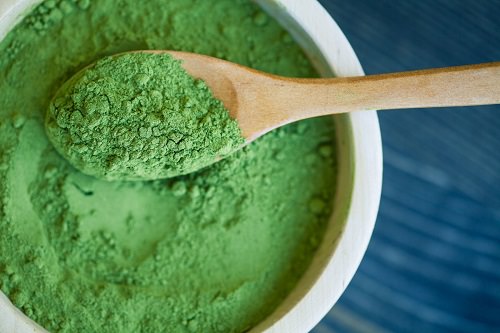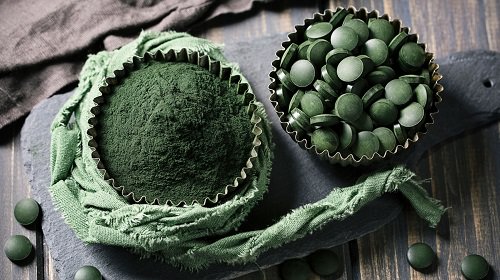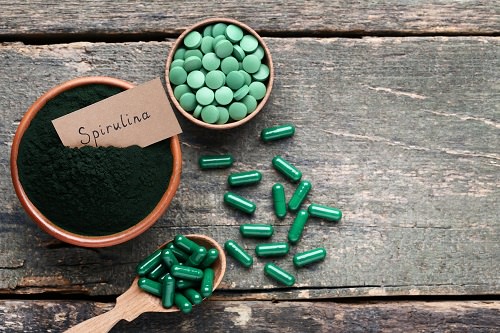Should spirulina be taken on an empty stomach? What are it’s health benefits? Know everything about spirulina in this article.
Spirulina is the product of Arthrospira platensis, a microscopic cyanobacterium species that is a blue-green alga. The bacterium has filaments in a spiral pattern, hence the name.
Spirulina can grow in salt water and fresh water; it thrives in highly alkaline lakes in sunny countries like Greece, Japan, India, U.S.A, and Spain. These ideal conditions are artificially replicated to cultivate the crop commercially.
Spirulina’s nutritional value has been recognized for centuries. The ancient Aztec people would use it to enhance the endurance of their messengers, who had to cover long distances on foot. More recently, NASA deployed it as a dietary supplement for astronauts on space missions; hence, Spirulina’s popularity skyrocketed.
Nutritional Value
Spirulina is available as a supplement in the form of tablets or dried powder. One tablespoon of powder, which is approximately 7 grams, amounts to 20 calories and 4 grams of protein. This is one of the highest concentrations of high-quality protein (by weight) among known foods. Spirulina is recognized as a vegan superfood. It supplies all nine essential amino acids, and it is also a rich source of iron, copper, and vitamins B1, B2, and B3.
It contains small quantities of almost every nutrient prescribed for a healthy diet, including both omega-6 and omega-3 fatty acids, in a proportion that reduces inflammation.
Should Spirulina Be Taken on An Empty Stomach
Spirulina can be taken throughout the day, but to optimize the bio-availability concentration of nutrients, it is best consumed on an empty stomach, at least 15 minutes before a meal.
There is no recommended daily dosage of Spirulina. One should start with 500mg/1g thrice a day and work their way up to higher doses after consulting a physician. Studies have noted positive health benefits with daily doses ranging from 1-8g.
Health Benefits of Spirulina
1. Antioxidant and Anti-Inflammatory
Spirulina contains phycocyanin, which is an antioxidant that fights free radicals and blocks molecules that stimulates inflammation.
2. Heart Health
It lowers total cholesterol and reduces harmful triglycerides and LDL (low-density lipoproteins) while increasing the proportion of healthy HDL (high-density lipoproteins). It also combats the oxidation of LDL that leads to the development of heart disease.
3. Cancers
Clinical studies have shown that Spirulina can lower tumor size and reduce cancer recurrence, especially oral cancers.
4. Reduces Blood Pressure
By stimulating nitric oxide that also triggers vasodilatation, a process that makes blood vessels relax.
5. Anti-Oxidant
As noted by the Aztecs, the antioxidant action of Spirulina serves to improve muscle strength and also physical endurance by reducing muscle fatigue.
6. Anaemia
Spirulina helps in fighting anemia by increasing hemoglobin content in red blood cells.
7. Reduces Allergic Rhinitis Symptoms
Rhinitis symptoms like running nose, sneezing, itching, nasal congestion, inhibiting histamine release can all be reduced with Spirulina.
8. Mood Improver
Spirulina provides the amino acid tryptophan that supports serotonin production. Serotonin is the hormone that stabilizes mood and promotes feelings of happiness and well-being. The benefits of Spirulina in treating depression, stress, and anxiety are being studied.
9. Anti-Viral Effects
Researchers have noted the anti-viral effects of spirulina in laboratory studies against HIV, herpes, and also measles virus.
Precautions
You can easily incorporate spirulina powder into smoothies, juices, and salads, but cooking, boiling, or microwaving may affect the potency of nutrients in it.
- Spirulina has a diuretic property. It releases sodium that needs to be flushed out in urine, so increase your water intake accordingly.
- It is not advisable if you have autoimmune diseases, bleeding disorders, and phenylketonuria as there have been cases where it has exacerbated these conditions.
- Insomnia, vomiting, allergic reaction, and also abdominal discomfort are potential side effects of spirulina consumption.
- Spirulina may absorb toxins from the environment as it grows, so quality control during cultivation is crucial.
- Avoid this if you are pregnant.





